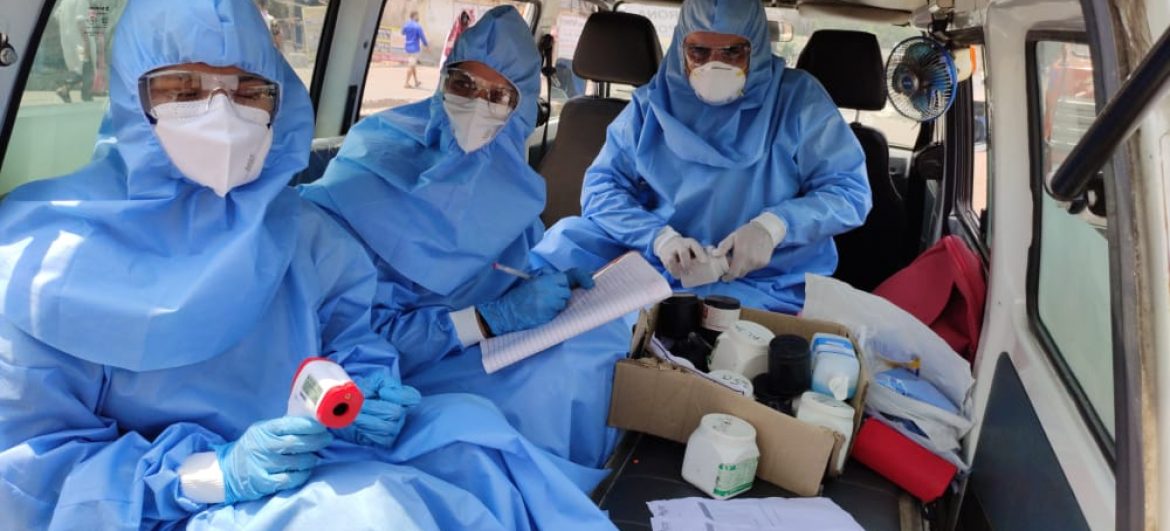Quis autem velum iure reprehe nderit. Lorem ipsum dolor sit nulla or narjusto laoreet onse ctetur adipisci.

- September 18, 2020
- Health, Opinion and Analysis
India’s front line captains need greater support to defeat covid
They’re clearly working tirelessly but the lack of a coherent central strategy ails the country’s efforts
Anand, Anish and I have travelled to scores of districts across many states in the past eight weeks. Places where our Foundation has been supporting the local administration and health system in tackling the exploding pandemic. We met healthcare workers, NGOs, and officials, including the chief executive officers (CEOs) of zilla parishads and district collectors. They are woefully short of resources and numbers. But for their dedication and courage, the pandemic would have been many times worse than it already is.
All the collectors and CEOs are from the Indian Administrative Services (IAS). We would have met over 30 of them in these weeks. As captains, they are truly leading from the front. Their commitment, hard work, competence, and resourcefulness are remarkable. My father was an IAS officer, and I grew up in that milieu, so my assessment may be biased. But Anish grew up on a steady diet of Malayalam movies as the only source of information on IAS officers. They were all incompetent or high-handed or corrupt (usually all together), and would finally get their comeuppance at the hands of the film’s upright sterling hero. Clinically objective, as Anish can be, he has now moderated his long-held dim view of them.
Both he and Anand keep urging me not to use military terminology in relation to the pandemic, but here I will. Winning a battle requires courage and competence, of soldiers and their captain. We have showered much deserved encomiums on the soldiers so far. Now let us recognize that our captains are also doing an excellent job.
Most are unaware of the crucial role these young officers are playing. Add to that the in-vogue belief that IAS officers can do no good. So, their contributions are rarely, if ever, acknowledged. The truth is that we won’t be anywhere in these battles without these spirited captains. Are all these officers as purposeful and driven in peace time? I doubt it. But that doesn’t reduce the importance of their contribution today. Unfortunately, the consistency of the leadership quality in this war seems to decline with distance from the front line. I routinely run into outstanding senior officers, but also too often into those who do no credit at all to their stripes. No wonder that we are winning many battles but the war itself seems to be slipping away from our hands.
One of these young collectors eloquently summarized their general sentiment: “People in the state capital are three weeks behind reality on the ground and are helpless; people in Delhi are three weeks behind the state capital, but more often are clueless.” He was referring to officers and professionals from whom he had a right to expect operational support and expert guidance. The sorry story of covid testing best exemplifies his frustration, and has been repeated to us across states. Here is the brief version.
First, the facts. We have botched up testing. The screaming headlines that “India is doing 2.75 lakh tests per day” or “has done 1.1 crore tests” should not have the congratulatory tone they have. Instead, these should unfurl the lack of coherent planning and poor execution, retrieved somewhat by a scramble in some regions. The telling number really is of tests conducted per million of our population. We are at under 9,000, with 136 countries better than us. Of these, 108 are doing more than 20,000, 57 countries more than 50,000 and 31 countries more than 100,000. That tells you where we stand.
Our front line captains were the first to realize the centrality of testing—in April. With experience and common sense, it became clear that the most basic step was to identify those infected, by screening the symptomatic, as also those who may have been exposed, and if possible, conduct general randomized testing for proactive surveillance. They needed testing capacity for this, which was available only in India’s big cities and was a minuscule fraction of what was required. So, they saw good sense in the Indian Council of Medical Research (ICMR) guidance of very limited testing.
But their acceptance of the ICMR’s advisories turned to bafflement when the body kept insisting that the narrow testing strategy was right not only in the moment, but was right, period. With the ICMR busy defending its approach, no plan was made for a nationally coordinated scaling up of testing capacity. As one of the collectors described it succinctly: “Estimating the number of machines required per million of population was easy. A contract with the few global vendors that there are, would have got us adequate testing infrastructure in 8-12 weeks. All for less than ₹1,500 crore for the entire country.” But with the ICMR signalling the opposite, there was confusion across the administrative system. A few states or individual officers heeded voices from the ground and did a better job. In most cases, nothing moved, and those at the front lines had to fend for themselves. Resultantly, we are in the state that we are.
Our captains at the front and their troops often feel that they are on their own; testing is only one story of many. To win this war, we must correct course on multiple fronts. Most importantly, we must strengthen the front line and support our captains. They are doing their jobs well. The rest of us must do our share.
Anurag Behar is CEO of Azim Premji Foundation and also leads sustainability initiatives for Wipro.

You must be logged in to post a comment.
This site uses User Verification plugin to reduce spam. See how your comment data is processed.